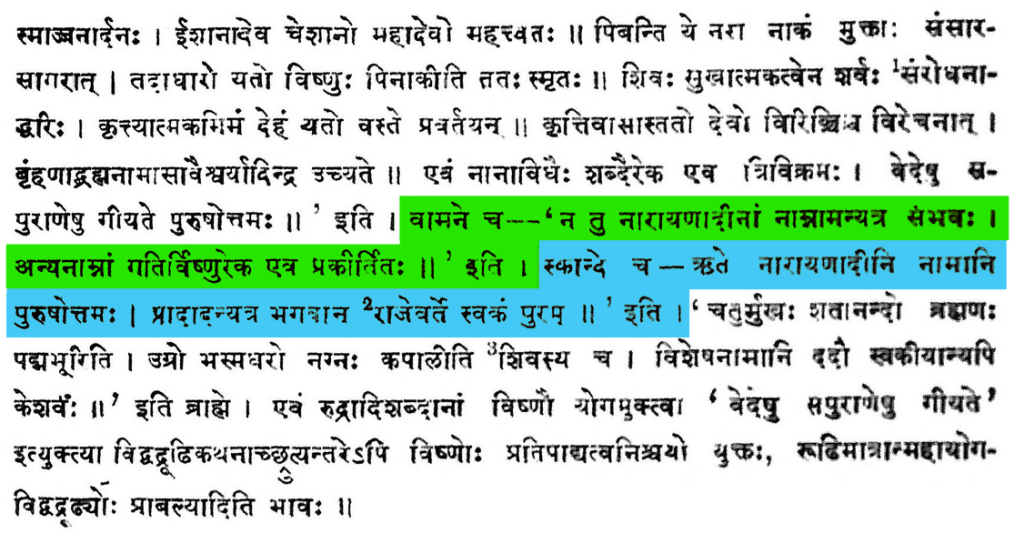हरये नमः । Haraye Namaha.
This article shall explain certain details about the name ‘Naaraayana’. This is one of the most important names of Shri Vishnu and repeatedly occurs in the Shaastras. It is a samjna or a name specific to a certain entity (Vishnu), as per Rshi Paanini’s Ashtaadhyaayi, a work on Sanskrit grammar.
The characteristics of a samjna are explained in the following Sutra:
पूर्वपदात् संज्ञायामगः ।
Ashtaadhyaayi Sutras, Adhyaaya 8, Paada 4, Sutra 3
Its meaning is explained as follows:
संज्ञायाम् पूर्वपदात् रषाभ्याम् नः णः, अगः ।
“In a samjna, the letters ‘ra’ (र) and ‘sha’ (ष) in the first word, change the letter ‘na’ (न) to ‘na’ (ण) and the letter ga (ग) is absent.”
The meaning of the Sutra is simple — a samjna must be yaugika, or a combination of two words. Rudhi words are those which are a single word and not formed by combination of separate words. The first word must contain either ‘ra’ (र) or ‘sha’ (ष) and the second word must contain ‘na’ (न), which should become ‘na’ (ण), upon combination. The letter ‘ga’ (ग) should be absent. The Sutra, along with commentaries, can be read here: https://www.ashtadhyayi.com/sutraani/8/4/3
All these are matched perfectly by the name Naaraayana, as shown in the following shloka of the Vishnu Puraana:
आपो नारा इति प्रोाक्ता आपो वै नरसूनवः ।
अयनं तस्य ताः पूर्वं तेन नारायणः ॥The waters are called Naaraa, as they are the offspring of Naaraa and earlier, they were His first ayana (abode). Thus, He is known as ‘Naaraayana’.
Vishnu Puraana, Amsha 1, Adhyaaya 4, Shloka 6

The name ‘Naaraayana’, is a combination of two words — naara (water) and ayana (abode). The first word contains the letter ‘ra’ and the second word contains the letter ‘na’. During combination, the ‘na’ in ‘ayana’ turns into ‘ण’.
Similarly, there are other reasons why Bhagavaan is known so, as explained in the following pramaanas.
कामं देवाऽपि मां विप्र न हि जानन्ति तत्त्वतः ।
त्वत्प्रीत्या तु प्रवक्ष्यामि यथेदं विमृजाम्यहम् ॥ १ ॥पितृभक्तोसि विप्रर्षे मां चैव शरणं गतः ।
ततो दृष्टोस्मि ते साक्षाद्ब्रह्यचर्यं च ते महत् ॥ २ ॥आपो नारा इति प्रोक्तास्तासां नाम कृतं मया ।
तेन नारायणप्युक्तो मम तत्त्वयनं सदा ॥ ३ ॥अहंनारायणो नाम प्रभवः शाश्वतोऽव्ययः।
विधाता सर्वभूतानां संहर्ता च द्विजोत्तम ॥ ४ ॥(The Deva said): “O Braahmana, the Devas even do not truly know Me. As however, I have been gratified with you, I will tell you how I created the universe. Viparshi, devoted to your ancestors, you have also sought My protection. You have also directly seen Me and the merit of your Brahmacharya is also great. In ancient times, I called the waters by the name of ‘Naaraa’ and because the waters are always My abode, I am known as ‘Naaraayana’. I am Naaraayana, the source of everything, the eternal, the immutable. I am the creator of all entities and their destroyer, O Dvijottama.”
Mahaabhaarata, Vana Parva, Adhyaaya 192, Shlokas 1-4
नराज्जातानि तत्वानि नाराणीति ततो विदुः ।
तान्येव चायनं तस्य तेन नारायणः स्मृतः ॥ ७ ॥“From the Supreme Purusha called ‘Nara’, the Tattvas originated and thus, they are known as ‘Naaras’. They are His abode and due to that, He is called ‘Naaraayana’.”
Mahaabhaarata, Anushaasana Parva, Adhyaaya 186, Shloka 7 (Quoted by Shri Vedaanta Deshika, in Rahasyatraya Saara, Chapter 27)
Shripaada Madhvacharya, in his Brahma Sutra Bhaashya, Adhyaaya 1, Paada 3, Sutra 3, quoted the following pramaanas:
वामनेा च
‘न तु नारायणादीनां नाम्नामन्यत्र सम्भवः ।
अन्यनाम्नां गतिर्विष्णुरेक प्रकीर्तितः’ इति ॥“But the names, (such as) Naaraayana, cannot denote anyone other than Vishnu, while Vishnu is that single one, whom the names of all others primarily denote,” thus (is said) in the Vaamana Puraana.
स्कान्देा च
‘ऋतेा नारायणादीनि नामानि नामानि पुरुषोात्तमः ।
प्रादादन्यत्र भगवान् राजेावर्तेा स्वकं पुरम्’ इति ॥“Purushottama has given other individuals his own names, except ‘Naaraayana’, just as a king confers various parts of his kingdom on other people, except his own city,” thus (is said) in the Skanda Puraana.
Both of these pramaanas were also quoted by Shri Krshna Brahmatantra Parakaala, a Shri Vaishnava scholar, in his work ‘Ratnaprakaashika’. They have also been quoted by Shri Bhattoji Deekshita, a disciple of Shri Appayya Deekshita, in Tattvakaustubha, Adhyaaya 1, Paada 3, Sutra 3.

The Vaamana Puraana reference is repeated in the Haarita Smrti:
व्यवह्रियन्ते सततं लोकवेदानुसारतः ।
Haarita Smrti, Adhyaaya 7, Shloka 57
न तु नारायणादीनि नामान्यन्यस्य कर्हिचित् ॥
Shri Vedaanta Deshika explains the same in his work, known as ‘Tattvamuktaakalaapa’ (3.5):
निस्साधारण्य-नारायण-पद-विषये निश्चयं यान्त्य्-अबाधे
सद्-ब्रह्म्-आद्यास्-समान-प्रकरण- पठिताश् शङ्कितान्यर्थ शब्दाः।
अन्तर्यन्ता च नारायण इति कथितः; कारणं चान्तर्-आत्मेत्य्
अस्माद्-अप्य्-ऐक कण्ठ्यम् भवति निरुपधिस् तत्र शम्भ्वादि शब्दाः॥
In his commentary, he says:
सद्-शब्दस्तावत् सत्तायोगिषु सर्वेषु प्रवृत्ततया न विशेष निर्धारणार्हः । ब्रह्मशब्दः एकरूढोऽपि बहुषु रूढवत् प्रयुक्ततया अन्यार्थत्व शङ्कार्हः स्यात् । आत्मशब्दस्च जीव-पराधि-साधारण-प्रयोगः । एवं पुरुष-प्राण्-आक्षर-शब्दा अपि ।
नारायणशब्दस्तु न जात्युपाधिवचनः, न वाऽनेकरूढः । अतस्तेन अन्येषाम् विषय-विशेषण-निर्धारणम् युक्तम् । तत्र च हेतुः समान-प्रकरण-पठिटत्वम् । अन्यथा पश्वधिकरणादेरपि भङ्गस्स्यात् ।
Here, he says that:
- The word Sad (Sat) cannot connote a specific entity as it is used to refer to the ordinary jagat by the Sarvajagatsattaavaadins.
- The word Brahman although has a commonly understood single sense, it is applied in reference to multiple entities commonly. Therefore it cannot be used in a unique manner as it can cause confusion.
- The word Aatman is used normally in many senses to refer to the jeeva as well as the Paramaatma.
- Similarly, words like Purusha, Praana, Akshara also are incapable of denoting a unique entity.
- Unlike these, the word ‘Naaraayana’ is neither used a descriptor of categories (jaati) nor attributes (upaadhi).
- Nor is it commonly/popularly used to refer to many different entities.
- Therefore it is proper (not ambiguous) for it to have a object-attribute relationship with other words (other words are the attributes).
- This is because of it (the word Naaraayana) being used identically (as the other words like Sat, Brahman, etc.) in the same context (where the other word appears).
- Otherwise Chaaga-Pashu-Nyaaya and other rules would be violated.
Chaaga-Pashu Nyaaya is a rule of Purva-Meemaamsa, according to which, if there are two statements:
A: Sacrifice a goat
B: Sacrifice an animal
When two similar statements are found, the general term in statement B (animal) must be replaced with the more specific term from statement A (goat). Hence, statement B also means, “sacrifice a goat”. Similarly, the Shaastras say:
- Naaraayana is Param Brahma, One without a second. (Naaraayana Upanishad, Khandas 2 and 4; Taittireeya Aaranyaka, Prashna 10, Anuvaaka 13, Naaraayana Sukta, Mantra 4)
- Naaraayana alone existed in the beginning. (Maha Upanishad, Mantra 1)
- Rudra is Brahman, One without a second. (Shvetaashvatara Upanishad, Adhyaaya 3, Mantra 2; also in the Taittireeya Samhita, Kaanda 1, Prapaathaka 8, Mantra 6)
- Sat alone existed in the beginning, One without a second. (Chhaandogya Upanishad, Prapaathaka 6, Khanda 2, Mantra 1)
Through Chaaga Pashu Nyaaya, it implies that even the Chhaandogya Upanishad, Taittireeya Samhita and Shvetaashvatara Upanishad are referring to Shri Vishnu Himself. Therefore, the name Naaraayana is specific to Shri Vishnu.
श्रीकृष्णार्पणमस्तु ॥

Leave a Reply